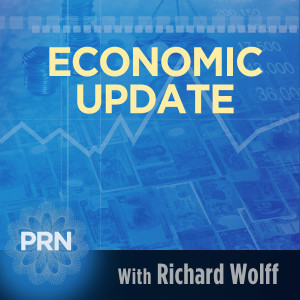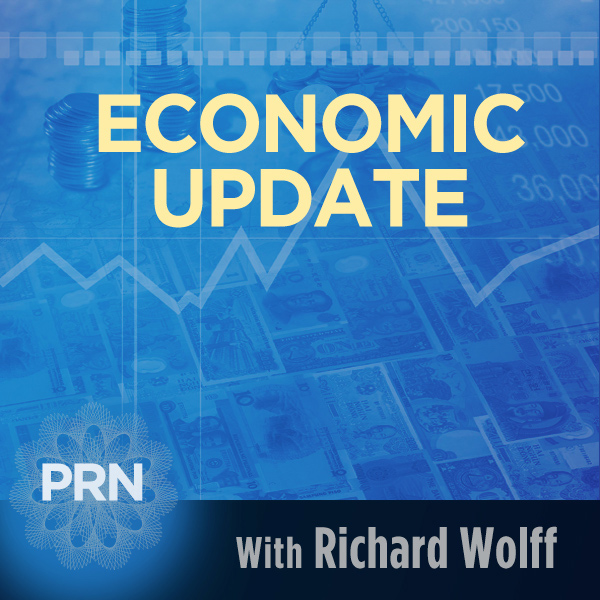Episodes

6 days ago
6 days ago
On this week's episode of Economic Update, Professor Wolff delivers updates on the political theater, of the U.S./Iran hostilities, the political shock of Zohran Mamdani's Democratic primary win in New York City, the withdrawal of union leaders from the Democratic National Committee, and the rising trade among BRICS crosses the $1 trillion milestone. In the second part of today's show, Prof. Wolff interviews two leaders of the musicians' union representing the orchestra of the Metropolitan Opera at Lincoln Center, New York City: Javier Gandara and Stephanie Mortimore.

Saturday Jul 05, 2025
Economic Update: How Deep 'Fascist' Parallels Run
Saturday Jul 05, 2025
Saturday Jul 05, 2025

Saturday Jun 28, 2025
Economic Update: Today's Crisis In the Middle East with Chris Hedges
Saturday Jun 28, 2025
Saturday Jun 28, 2025
On this week's episode of Economic Update, Professor Wolff has a one-on-one discussion with Pulitzer Prizewinner Chris Hedges, who draws on history, his years as a correspondent and NY Times Middle East Bureau Chief, and his current work on and in the Middle East. He explains why Israel attacked Iran and what the short and long-term prospects are for their war. He also devotes some of his analyses to examining Israel's genocidal policies toward Gaza's Palestinians.

Saturday Jun 21, 2025
Economic Update: Making Sense of Trump's Economic Plan
Saturday Jun 21, 2025
Saturday Jun 21, 2025
1. How Trump seeks to address the problem of costly American wars and their impact on sharply rising budget deficits,
2. How the rising U.S. debt has led to the loss of the United States’ "AAA" credit rating,
3. How Trump’s response is to seek to slash government spending and raise money by imposing tariffs on the entire world,
4. How this backfires as other countries retaliate, hurting US exports and causing the dollar to lose its appeal as the world's safest currency,
5. How China's economic rise is more substantial than the U.S. measures aimed at stopping or slowing that rise,
6. How the declining U.S. empire undermines the U.S. capitalist economy by making it increasingly difficult for CEOs and other corporate leaders in the U.S., households, and the government to prevail over and dominate the U.S. economy and society.

Saturday Jun 14, 2025
Economic Update: Analyzing Trump's Mass Support
Saturday Jun 14, 2025
Saturday Jun 14, 2025
On this week’s episode of Economic Update, Professor Wolff delivers updates on the blow back to Iowa Senator Joni Ernst’s rationalization of budget cuts to Medicaid to help fund tax cuts for corporations and the rich, 8,000 Connecticut healthcare workers win contract gains by threatening to strike, and how the advertising industry spawned by capitalism distorts and corrupts human communication. The show's second half features an interview with UC-Berkeley Professor Arlie Hochschild on the reasons why Trump's political base continues to support him.

Saturday Jun 07, 2025
Economic Update: Europe Declines Faster Than The United States
Saturday Jun 07, 2025
Saturday Jun 07, 2025
This week's Economic Update looks at how US production of wheel-barrows moved to China, and how the U.S. is adopting a Cold War mentality against China. Also discussed are the socioeconomic effects of US federal workers' being fired, as well as how tariffs alone won't reshore manufacturing. Professor Wolff then delves into the declines in US coal mining, in sales of US McDonald's hamburgers, along with commentary of the economic decline in Europe.

Saturday May 31, 2025
Economic Update: Who Will Likely Win and Lose the U.S.-China Trade War
Saturday May 31, 2025
Saturday May 31, 2025
This week on Economic Update, Professor Wolff delivers updates on Trump’s cuts to school mental health counsellors, the mass strike in LA County, why China is better positioned for a trade war with the U.S., and how profit is what drove corporate decisions to relocate U.S. factories overseas thereby making the US economy vulnerable to long, global supply lines.

Saturday May 24, 2025
Economic Update: The Corporatization of Universities and Trump's Attacks
Saturday May 24, 2025
Saturday May 24, 2025
This week on Economic Update, Professor Wolff begins by presenting updates on the death of libertarianism and the rise of US economic nationalism, and US universities are becoming big businesses, governed by money concerns. In this episode's second half, Professor Wolff interviews Professor Geert Dhondt, the Chair of the Economics Department and Economics Professor at John Jay College of the City University of New York, on how colleges and universities are reacting to Trump's attack on higher education.

Saturday May 17, 2025
Economic Update: Reform Vs. Revolution
Saturday May 17, 2025
Saturday May 17, 2025
Wolff begins this week on Economic Update by analyzing the choice between reform and revolution through two historical discussions: the anti-slavery fight in the mid-19th century and the anti-Depression fight in the U.S. during the 1930s. He then explains the stakes in choosing reform or revolution as goals for social change and outlines how and why both options are now back on the working class's agenda in the U.S. He concludes the discussion by suggesting that revolution is the necessary guarantor of the duration of reforms in the U.S., offering an alternative perspective to consider when choosing reform over revolution.

Saturday May 10, 2025
Economic Update: Twin Failures Of Capitalism - The Homeless and Housing Crises
Saturday May 10, 2025
Saturday May 10, 2025
This week's Economic Update focuses on Trump's attacks on Harvard, Trump's "antisemitism" maneuver against educational institutions, and US universities becoming ever more " business-like." as well as looking into the economics of US dollar depreciation since Jan 20, 2025. Also featured is an interview with Mr Rob Robinson, to be awarded an honorary doctorate from the City University of New York at its Commencement, June 10, 2025, recognizing his multiple contributions to fighting homelessness and inadequate housing in the US.

